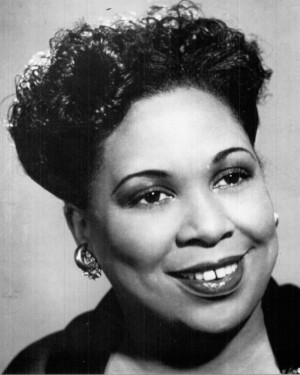Helen Humes was a short, buxom woman with twinkling eyes and a broad, warm smile. She had a motherly appearance even when she was singing the double entendre lyrics of such songs as ”He May Be Your Man but He Comes to See Me Sometimes” and ”The Million Dollar Secret,” which made up part of her repertory. She was usually thought of as a blues singer, but Miss Humes preferred ”pretty songs, torch songs.”
”Bessie Smith and Ma Rainey were two bluesy for me,” she told the jazz historian Stanley Dance, ”but people have always tried to make me a blues singer, right from my first record date.” First Record at 14That record date occurred when she was 14 years old, one year after she sang in public for the first time with a Sunday school band in Louisville, that included the trumpeter Jonah Jones and the trombonist Dicky Wells. A guitarist, Sylvester Weaver, who thought she sounded like Ethel Waters, recommended her to a recording executive. She was sent to St. Louis with her mother where she recorded such tunes as ”If Papa Has Outside Lovin,’ ” ”Do What You Did Last Night,” and ”Everybody Does It Now.”
Such songs – ”I didn’t know then what the words of the songs really meant,” she said later – scarcely fitted in with her sheltered, middle-class background. She was born in Louisville on June 23, 1913. Her mother, Emma Johnson, was a schoolteacher, and her father, John Henry Humes, was one of the first black lawyers in Louisville.
Although she was urged to go to New York after she made her recordings, her mother refused to let her leave school. After high school, she worked in the first black band in Louisville. Miss Humes began singing professionally when she went to visit some friends in Buffalo. She stayed there a couple of years and then returned to Louisville. The Pull of Home
”I never was a person to stay away from home too long,” she told Mr. Dance. ”Later on, I would always make it my business to come home once or twice a year.”
In 1937, she was singing at the Cotton Club in Cincinnati when Count Basie’s band came through town. Billie Holiday, who had been singing with it, had just left the band, and Mr. Basie asked Miss Humes to take her place. When she found that the pay was $35 a week, she turned the offer down. ”I can make that here,” she told Mr. Basi e, ”and I don’t have to go no place.” But when Al Sears’ band, with whom she was singing in Cincinnati, went to New York, Miss Humes went with them. In New York, at the Renaissance Ballroom, she was heard by John Hammond, who had discovered Billie Holiday and had recruited m any musicians for both Benny Goodman and Count Basie. At his urging, she joined the Basie Band in 1938. The pay was still $35 a week.
With the Basie band, Miss Humes sang ballads and pop songs, although she occasionally got a standard such as ”If I Could Be With You.” But her only notable blues was a blues parody, ”Sub-Deb Blues.” Among her fans there was some resentment that she rarely got to sing a blues but Jimmie Rushing was the established vocalist with the Basie band then and he had staked out the blues as his territory. A Star as a Single
After she left the Basie band in 1942, Miss Humes worked as a single and became a star in the rhythm and blues field when she recorded a rocking blues, ”Ee Baba Leba.” For the next dozen years, Miss Humes worked namely in the rhythm and blues situations.
A tour of Australia with Red Norvo in 1957 brought her back into jazz and led to her first LP’s, made for Contemporary Records. During the early 1960’s, Miss Humes spent much of her time in Europe. She returned to Louisville in 1967 when her mother became ill and, after her mother died, she decided to give up singing and stay with her father. She took a job in a munitions factory making gunpowder.
She had not sung for six years when, in 1973, Mr. Dance persuaded her to come to New York to take part in a tribute to Count Basie at the Newport Jazz Festival. She again appeared briefly in New York in 1974 at the Half Note and the following year, after her father died, she began an engagement at the Cookery that sparked the most successful years of her career. She was rediscovered by her old fans and discovered by a generation that was too young to have heard her with Count Basie. ‘One of the Best’
Hearing her at the Cookery, Whitney Balliett wrote in The New Yorker that Miss Humes was ”one of the best and most durable of American popular singers who bears easy comparison with Billie Holiday and Mildred Bailey.”
During the late 70’s she toured Europe frequently and made several reappearances at The Cookery. [New York Times obituary]

